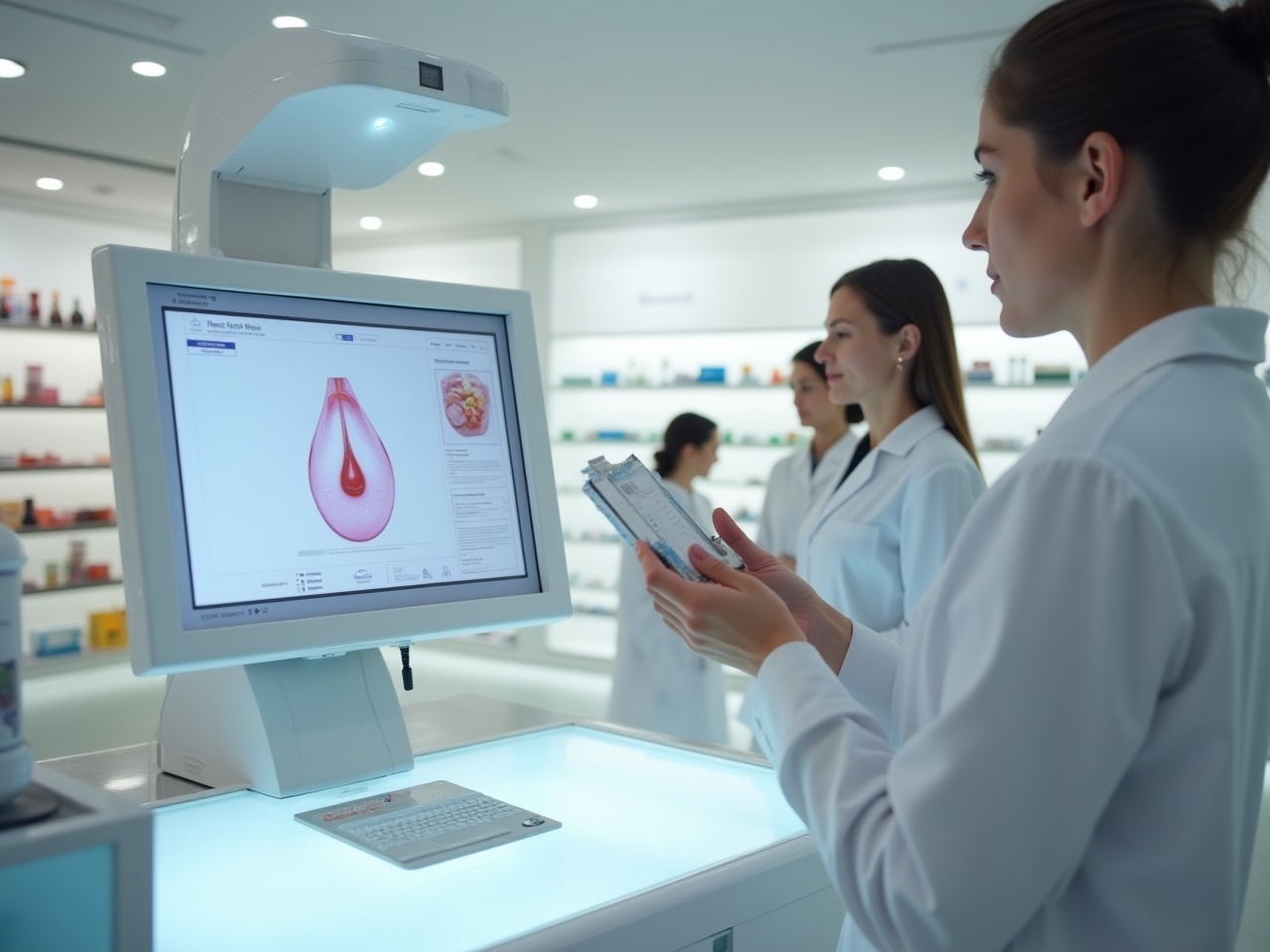The retail health landscape is undergoing a profound transformation—not through science-fiction inspired kiosks that analyze blood droplets in minutes, but through sophisticated AI systems that integrate shopping behavior, clinical insights, and personalized recommendations. Leading this shift are pragmatic collaborations like Walmart and Soda Health’s Everyday Health Signals™ program, which turns routine grocery purchases into actionable health insights for Medicare Advantage and Medicaid members. Meanwhile, in rural India, Ayur.AI’s village kiosks demonstrate how traditional medicine can merge with AI diagnostics to serve underserved communities. These initiatives represent a fundamental reimagining of preventive care—one grounded in data privacy, regulatory compliance, and measurable outcomes rather than speculative technology.
The Real-World Architecture of Personalization
Contrary to futuristic visions of instant biomarker analysis, today’s proven systems leverage existing data streams:
- Walmart’s platform analyzes purchase histories of opted-in members to identify nutritional gaps—not through blood tests, but through algorithmic evaluation of food choices. When a customer consistently buys high-sodium foods, the system suggests lower-sodium alternatives and provides customized recipes. This approach respects current technological limits while delivering tangible value.
- Sage Healthspan’s privacy-first app exemplifies the clinical side of this revolution. By allowing users to securely upload lab results for on-device AI analysis, it identifies trends like creeping cholesterol levels before they become critical health threats—all without storing data in the cloud.
- Ayur.AI’s village kiosks in Bhiloda, Gujarat, integrate Ayurvedic principles with basic health screenings. Deployed through partnerships with NGOs, these units provide accessible diagnostics in regions lacking medical infrastructure.
Dr. Pravene Nath, Walmart’s Group Director of Consumer Health, emphasizes: “We’re not replacing physicians—we’re turning shopping carts into preventive health tools. When someone buys oatmeal and bananas, we can nudge them toward magnesium-rich spinach if our AI detects patterns suggesting muscle cramps.” This philosophy underpins retail health’s evolution: leveraging accessible behaviors to drive wellness.
The Business Logic Driving Adoption
1. Solving the $10B Medicare Waste Problem
Nearly two-thirds of Medicare Advantage members never use their Over-The-Counter (OTC) benefits, leaving billions unclaimed annually due to complex access barriers. Walmart and NationsBenefits tackle this by embedding benefit eligibility directly into product displays and digital platforms. Members see real-time OTC balances when scanning items in-store or online, turning abstract benefits into concrete purchasing power. Early results show a 37% increase in benefit utilization among participating plans.
2. Hybrid Human-AI Care Models
Planet Fitness and similar retailers deploy AI not as a replacement for experts, but as a force multiplier. Their apps track equipment usage, suggest form adjustments, and alert trainers when members plateau—creating opportunities for targeted human intervention. This mirrors Walgreens’ approach with Labcorp: in-store sample collection kiosks provide phlebotomy access, but results are analyzed in certified labs and delivered digitally days later.
3. The Data Value Exchange
Consumers increasingly trade anonymized data for personalized insights. Sage Healthspan’s model illustrates this balance: users gain deep health analyses while retaining full data ownership. As CEO Megan Haas notes, “Privacy isn’t opposed to personalization—it enables trust. Our on-device AI proves you needn’t upload health data to receive sophisticated insights.”
Navigating Regulatory and Ethical Complexities
The FDA’s Cautious Stance
Current regulations sharply distinguish wellness tools from diagnostic devices. While Walmart’s shopping analysis requires no FDA approval, blood-testing systems like those once proposed by Theranos face intense scrutiny. The agency’s 2024 guidance clarifies: apps suggesting “iron-rich foods” based on purchases are Class I wellness devices, whereas platforms claiming to “detect anemia” from self-tests are regulated as medical devices. This boundary remains pivotal for retailers.
Data Governance Imperatives
With health data breaches costing $10.9M per incident, retailers prioritize bulletproof security:
- Soda Health uses blockchain-based consent management, requiring explicit member opt-in before sharing data with insurers
- Sage Healthspan’s on-device processing avoids cloud vulnerabilities entirely
- FTC actions against Ancestry.com ($2.3M settlement for data misuse) serve as cautionary tales for retailers
Global Models of Success
Japan’s Tech-Enhanced Eldercare
Facing a rapidly aging population, Japanese retailers like Rakuten combine kiosks with tele-nutritionist access. Seniors receive dietary advice via video consultation after basic biometric screenings—blending human expertise with digital convenience. This hybrid approach increased supplement adherence by 63% compared to purely automated systems.
Germany’s Science-First Validation
German consumers demand evidence-based health tools. Lykon’s supplement kiosks, co-branded with the Fraunhofer Institute, publish clinical trial data showing users achieved 28% higher vitamin D levels versus control groups. “In Germany,” notes Fraunhofer’s Dr. Anika Bauer, “peer-reviewed validation isn’t optional—it’s the price of market entry.”
India’s Rural Health Revolution
Ayur.AI’s Bhiloda kiosk exemplifies appropriate technology for resource-limited settings. The unit combines Ayurvedic pulse diagnostics with blood pressure screening and AI-driven lifestyle recommendations. Deployed through IEEE’s Smart Village initiative, it serves villages lacking clinic access. Project head Arvind Patel observes: “For farmers earning $5 daily, a $10 supplement is irrelevant. Our AI suggests dietary changes using locally grown millet and moringa—wellness rooted in reality.”
The Road Ahead: Pragmatic Innovation
The next evolution focuses on integration, not sci-fi promises:
- Kaiser Permanente’s Diabetes Pilot: Integrating continuous glucose monitors with Walmart purchase data to suggest real-time food swaps when blood sugar trends upward
- Soda Health’s Predictive Modeling: Analyzing seasonal purchase shifts to pre-empt vitamin D deficiency in northern climates
- Walmart’s Benefit Tracker: Solving the “use-it-or-lose-it” problem for Medicare OTC funds with real-time balance alerts
As Robby Knight, CEO of Soda Health, asserts: “The future isn’t in mall kiosks that promise magic pills. It’s in turning existing behaviors—like grocery shopping—into opportunities for prevention.”
Conclusion: Revolution Through Evolution
The true retail health revolution isn’t about flashy biotech displays. It’s happening through:
- Data Leverage: Transforming purchase histories into preventive insights
- Strategic Partnerships: Retailers + insurers + tech firms creating closed-loop ecosystems
- Regulatory Respect: Differentiating wellness guidance from medical diagnostics
- Access Expansion: From Arizona Medicaid members to Gujarati farmers
Dr. Mark Hyman of Cleveland Clinic summarizes: “Tech succeeds when it solves human problems, not tech problems. Walmart helping diabetics choose better food? That matters. A kiosk promising 68 biomarkers in 90 seconds? That’s a fantasy that distracts from real progress.”
The 2025 retail health leaderboard reflects this pragmatism: companies winning through integration (Walmart-Soda Health), privacy (Sage Healthspan), and accessibility (Ayur.AI)—proving that revolutions often look less like explosions and more like careful, conscious evolution.









